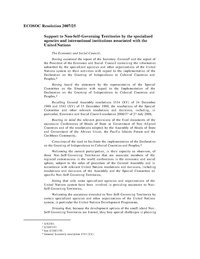
International Covenant on Economic, Social and Cultural Rights
Covenant adopted in 1966 by United Nations General Assembly resolution / From Wikipedia, the free encyclopedia
Dear Wikiwand AI, let's keep it short by simply answering these key questions:
Can you list the top facts and stats about International Covenant on Economic, Social and Cultural Rights?
Summarize this article for a 10 years old
The International Covenant on Economic, Social and Cultural Rights (ICESCR) is a multilateral treaty adopted by the United Nations General Assembly (GA) on 16 December 1966 through GA. Resolution 2200A (XXI), and came into force on 3 January 1976.[1] It commits its parties to work toward the granting of economic, social, and cultural rights (ESCR) to all individuals including those living in Non-Self-Governing and Trust Territories. The rights include labour rights, the right to health, the right to education, and the right to an adequate standard of living. As of July 2020, the Covenant has 171 parties.[3] A further four countries, including the United States, have signed but not ratified the Covenant.
 Parties and signatories to the ICESCR: signed and ratified signed but not ratified neither signed nor ratified | |
| Type | United Nations General Assembly Resolution |
|---|---|
| Drafted | 1954 |
| Signed | 16 December 1966[1] |
| Location | United Nations Headquarters, New York City |
| Effective | 3 January 1976[1] |
| Signatories | 71 |
| Parties | 171 |
| Depositary | Secretary-General of the United Nations |
| Languages | French, English, Russian, Chinese, Spanish and Arabic[2] |
| Full text at | |

The ICESCR (and its Optional Protocol) is part of the International Bill of Human Rights, along with the Universal Declaration of Human Rights (UDHR) and the International Covenant on Civil and Political Rights (ICCPR), including the latter's first and second Optional Protocols.[4]
The Covenant is monitored by the UN Committee on Economic, Social and Cultural Rights.[5]